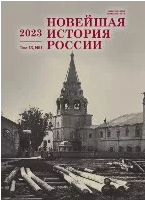Коллективный портрет депутатов Верховного Совета СССР и союзных республик в 1938–1989 гг.
Collective Portrait of Deputies of the Supreme Soviet of the USSR and Union Republics in 1938–1989
Author(s): Boris N. MironovSubject(s): Civil Society, Governance, Political history, Social history, Interwar Period (1920 - 1939), Post-War period (1950 - 1989), History of Communism
Published by: Издательство Исторического факультета СПбГУ
Keywords: Supreme Soviet; power; democratic authoritarianism; Zemsky sobor; electoral statistics; CPSU; elections;
Summary/Abstract: In 1938–1989, Supreme Soviets of the USSR and Union Republics were the successors of the Congresses of Soviets and performed the same functions assigned to them by the ruling party — to approve and convert the decisions of the Сommunist Party into laws, to support the policy pursued by the party and the government, to legitimize the existing regime. The Soviets performed these functions quite successfully due to the fact that the deputy corps included people from all social groups loyal to the regime and at the same time influential, authoritative, and well-known throughout the country. A simple Soviet citizen believed in the deputies and the real power of the Supreme Soviets, thanks to which the Soviets, having no real power, had great symbolic power, which allowed them until 1989 to maintain the trust of the people in the Soviet system and the communist project. In 1938–1989, the composition of the deputies of the Supreme Soviets of the USSR and the union republics underwent important changes: there was an in increase in the proportion of workers and peasants, women, educated people, and people of mature and senior age; the proportion of employees, Russians and semi-literate people decreased. The deputies’ corps became more balanced in all respects and significantly more educated, but members and candidates of the Communist Party, men, employees, intellectuals, functionaries, were still overrepresented, and non-party workers, peasants and Russians were underrepresented. In general, the deputy corps was comprised of the elite; the Supreme Soviets of the Union and Autonomous Republics — of the national elite of the titular peoples. They were not professional politicians, as in Western parliaments, but the elite. For the majority of deputies, activity in the Soviets was not the main profession, but an honorable part-time job on a voluntary basis.
Journal: Новейшая история России
- Issue Year: 13/2023
- Issue No: 42
- Page Range: 141-171
- Page Count: 31
- Language: Russian

